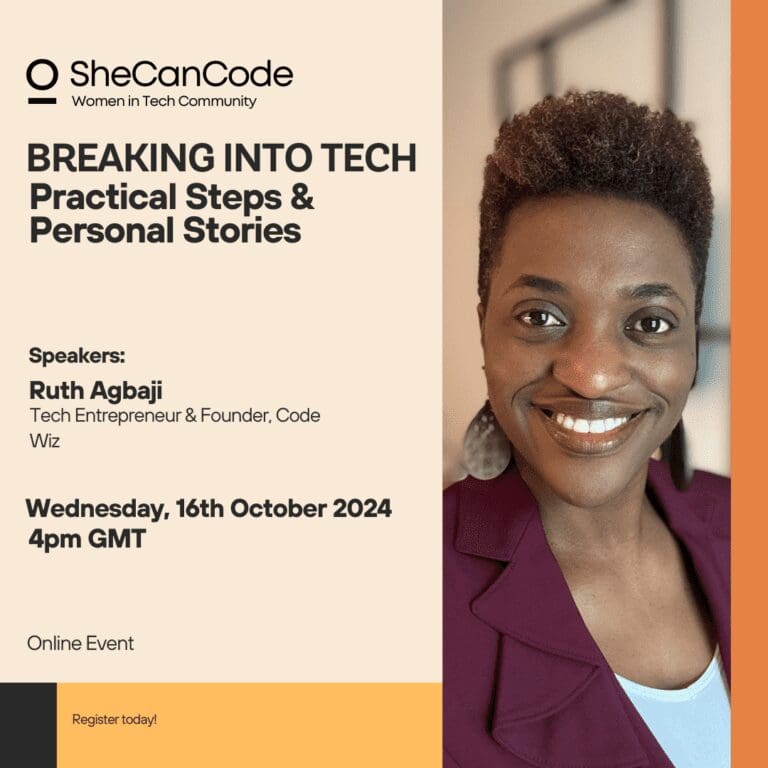Highlights include exploring various tech roles, learning beginner-friendly programming languages like Python and JavaScript, discovering affordable learning resources, and hearing Ruth’s success story.
Listen to Ruth Agbaji, a tech entrepreneur who taught herself coding, worked at Microsoft, and founded Code Wiz, a nationwide coding school with 40+ locations. Recognized as an Entrepreneur Magazine Woman of Impact, Ruth will help you kickstart your tech journey.
Ruth Answers your Questions
-
What exactly is a tech career? If you use tech, does that count as “working in tech”?
A tech career typically involves roles that create, develop, or manage technology—such as software development, data analysis, cybersecurity, or IT support. If your primary job duties involve developing or managing tech products or solutions, that counts as a tech career. Simply using tech tools doesn’t necessarily mean you’re in a tech career, but it can be a stepping stone toward one.
-
Advice for interviews when transitioning into tech and competing with younger candidates?
Highlight your transferable skills and unique experiences, especially those that younger candidates may lack. For example, emphasize problem-solving, project management, or industry-specific insights. Practice explaining how these skills apply to tech, and show your commitment by mentioning relevant courses or certifications. Tailor your responses to showcase your adaptability and continuous learning mindset.
-
Advice on growing and staying relevant in tech?
Stay curious and continuously upskill. Follow industry trends, take online courses on emerging technologies, and attend tech conferences or webinars. Networking is also crucial—connect with others in tech to learn from their experiences. Setting learning goals, like mastering a new tool every quarter, can help you keep pace with the industry’s evolution. AI is taking the world by storm, you want to learn how to be a power AI user so you become more and more valuable.
-
How to leverage hospitality experience when breaking into tech?
Emphasize transferable skills like customer service, problem-solving, and multitasking. For example, if applying for a tech support role, highlight your experience handling customer inquiries under pressure. You could also focus on roles that blend tech and hospitality, like customer experience design or operations technology in the hospitality sector.
-
Which coding language is the most useful or in-demand?
For general versatility, Python is highly recommended due to its applications in data science, machine learning, and web development. JavaScript is essential for web development, while SQL is crucial for database management. Research the specific roles you’re interested in to see which languages are most commonly required. Remember though that once you learn one programming language, it is very easy to learn another language. If you’re a newbie, start with Python and grow from there.
-
Handling a technical interview question on an unfamiliar problem?
First, don’t panic. Explain your thought process out loud to show how you approach unfamiliar problems. Break down the problem into smaller parts and relate it to concepts you do know. Interviewers often look at how you think and tackle challenges, rather than expecting a perfect answer.
-
What’s the difference between programming and coding?
Coding involves writing code in a specific language to create software, while programming is broader, involving the planning, design, and implementation of an entire software solution. Coding is one step in the programming process, but programming includes other aspects like debugging and software architecture.
-
Tips for overcoming imposter syndrome?
Remember that imposter syndrome is common, especially in tech. Reframe self-doubt by recognizing your achievements and skills. Set small, realistic goals to build confidence, and celebrate each success. Seeking support from mentors or joining communities can also provide reassurance and validation.
-
Is it worth becoming self-taught in tech given the current competition?
Yes, it’s still worth it. While there’s competition, self-taught developers are increasingly common, and many companies value demonstratable skills over formal education. The key is to build a strong portfolio, gain practical experience, and network actively to increase your job prospects. Continuous learning is essential in tech, so being self-taught demonstrates initiative and adaptability.
-
How to begin learning to code?
Start with free resources like Codecademy, freeCodeCamp, or Coursera. Choose a language aligned with your goals (Python for general purposes, JavaScript for web development, etc.). Practice consistently with small projects, and join online coding communities to seek guidance and motivation.
-
Is a master’s degree necessary for a software engineering job in Europe?
Not necessarily. In tech, practical experience and a solid portfolio often matter more than advanced degrees. A master’s degree can be beneficial for specialized roles (like AI or data science) or if you’re interested in research, but it’s not a requirement for most software engineering positions. However, my experience with the European job landscape is limited.
-
How to get the first front-end developer role? Should you apply for junior roles?
Yes, applying for junior or entry-level roles is ideal. Building a portfolio with React projects can showcase your skills. Consider internships or freelance work to gain experience if needed, and look for roles that align with your current skill level to boost your confidence and capabilities.
-
Where to find a jargon buster for tech job descriptions?
Websites like TechTerms (techterms.com) and Indeed’s Glossary (indeed.com/career-advice) offer explanations of common tech terms. GitHub and Reddit communities are also good places to ask for clarifications on specific jargon.
-
Feeling inadequate with only 1 year of internship experience—any advice?
One year of experience is valuable! Focus on your accomplishments during that time, and continue building skills through projects or certifications. Reflect on what you learned during your internship, and be prepared to discuss it confidently in interviews.
-
What was the AI tool for interview preparation?
I mentioned tools like Pramp and Interviewing.io, which offer mock interviews and practice questions. These platforms can simulate real interview scenarios and help you improve your responses. Practicing with AI-powered tools or interactive platforms is a great way to prepare.
ChatGPT Prompts
Identifying the right tech role for you
I want you to think like a very experienced career coach. I’m exploring career opportunities in the tech industry but I’m not sure where to start. I’d like some guidance on finding the best fit for my skills and interests. Here’s a bit about me:
- Strengths: [List your top strengths, e.g., problem-solving, attention to detail, creativity, teamwork, etc.]
- Technical Skills: [Mention any technical skills you have, e.g., coding in Python, using Excel, graphic design, etc.]
- Interests: [Describe your interests within or outside of tech, e.g., web development, data analysis, AI, gaming, social media, etc.]
- Previous Experience: [Briefly outline your work or educational experience related to tech, if any.]
Based on this information, could you suggest the top three areas in tech where my strengths and interests might be a good match? Please explain why each area could be suitable and what steps I can take to explore these options further.
I’ve chosen a path in tech and I need some creative project ideas that help me develop and showcase my skills. Here’s what I’m focusing on:
- Chosen Tech Path: [Insert your chosen tech path, e.g., Data Science, Web Development, Cybersecurity, Health Tech, UX/UI Design, etc.]
- Interests: [Mention your specific interests that align with this path, such as analyzing social media trends, developing eco-friendly shopping platforms, enhancing online security for small businesses, creating digital health solutions, designing user-friendly mobile apps, etc.]
Could you suggest three project ideas at varying levels of complexity—simple, intermediate, and advanced—that incorporate my tech path and personal interests? Please provide a brief description of each project, highlighting what it could involve and the skills it would demonstrate.








